Oct
7
2013

“The Spirit consistently puts earthly Succession to death, dividing families, communities and entire countries, as we see today. To claim otherwise is to work against the Spirit in the world. My heredity, my household, my culture, is the target of my ministry, not its source.”
It’s time to get back into Galatians. To recap, the epistle follows the Covenant structure, but gives the central point, the Ethics, its own Covenant structure. If this thesis is correct, what we should expect in the next “cycle” (Gal. 3:26-4:7) is a discussion of Covenant Succession. Lo and behold, this is exactly what we find.
Continue reading
2 comments | tags: Abraham, Baptism, Circumcision, Covenant Theology, Ezra, Galatians, Genesis, Isaac, Leviticus, Moses | posted in Bible Matrix, Biblical Theology
Jan
15
2013
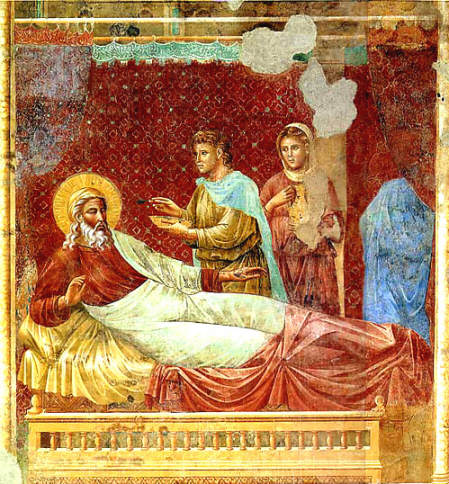
“Jacob didn’t steal the future. He rescued it from a Man who put food first and whose eyes were not yet opened.”
James Jordan has done the Church a great service by rehabilitating the reputations of Noah the drunk, Abraham the liar, Jacob the swindler and Moses the murderer. He has shown us that the context of these so-called sins and crimes mean that they are nothing of the sort. [1] By this, I don’t mean “cultural context” but Covenant context. The reason these great men of God (and their wonderful women) get such a bad rap is because their stories are treated like a bunch of separate things that occurred, from which we must draw obvious and disconnected morals, rather than a single narrative begun in Genesis 1.
Continue reading
Comments Off | tags: Abraham, Covenant Theology, Esau, Genesis, Isaac, Jacob, James Jordan, Noah | posted in Bible Matrix, Biblical Theology
Aug
29
2011
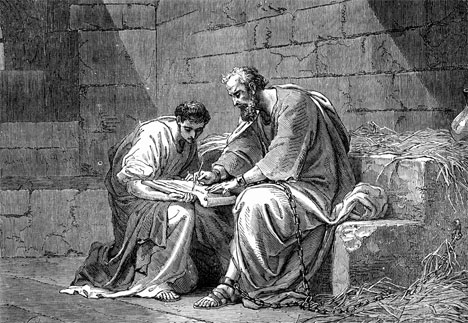
“But when you do a charitable deed, do not let your left hand know what your right hand is doing…” Matthew 6:3
When it comes to doctrine, Mark Driscoll defines all issues as either closed-handed or open-handed. The non-negotiable fundamentals are held with a closed hand. In the open hand are issues that can be debated without shafting a church’s faithfulness to the apostles’ doctrine.
Continue reading
Comments Off | tags: Isaac, Mark Driscoll, Paul, Spiritual Growth, Tabernacle, Wisdom | posted in Biblical Theology, Christian Life
Jan
22
2010
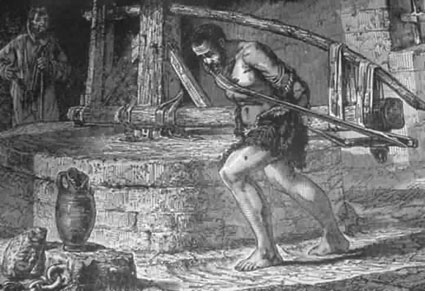
26. Christ returned in A.D. 70 (?), but according to preterists the literal cloud was missing (see Acts 1: 9; Matt. 24: 30; Rev. 1: 7).
The “Bible matrix” pattern always begins with a Word from God’s glory cloud on the Lord’s Day (Sabbath), the accepted Mediator received into this single-cloud “Tabernacle” (Firstfruits) and ends with multiple clouds, a corporate Mediator (the body). The Feast of Tabernacles (“succoth”) is literally the Feast of Clouds. This was fulfilled in AD70. Christ ascended to prepare the place, and the firstfruits church was received into it at the destruction of the Temple.
See also Not Just Any Old Cloud.
Continue reading
Comments Off | tags: Feasts, Glory cloud, Isaac, Jacob, Judaisers, Samson | posted in Biblical Theology, The Last Days
Nov
5
2009
and Feasts in Genesis 27
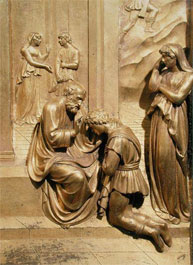 .
.
The content of this post has been revised and included in Bible Matrix II: The Covenant Key.
See also Joseph as Torn Veil.
1 comment | tags: Esau, Feasts, Genesis, Isaac, Jacob, Peter Leithart, Rebekah | posted in Biblical Theology
Sep
2
2009
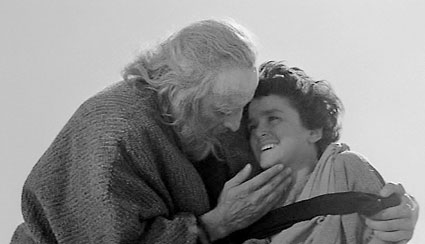
“Look now toward heaven, and count the stars if you are able to number them.” And He said to him, “So shall your descendants be.” And he believed in the LORD, and He accounted it to him for righteousness.
—Genesis 15:5-6
Abraham didn’t sleep in on the day he was to take his beloved son, his only son, to Moriah, kill him and offer him as an ascension. He got up early. By this stage in the narrative, Abraham had been tried and tested many times, but this seems just a little too keen.
Continue reading
Comments Off | tags: Abraham, Covenant Theology, Doug Wilson, Faith, Hebrews, Isaac, Martyrdom, Peter Leithart, Ray Sutton | posted in Christian Life
May
11
2009
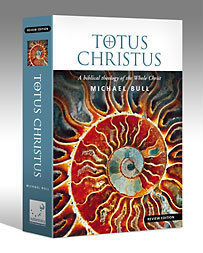
Abraham had gone to extreme measures to make sure Isaac didn’t intermarry with Canaan and pollute the promise. He sent his most faithful servant as a forerunner to find a bride for his son. Like John the Forerunner, the most faithful servant found the beautiful bride, Rebekah, by the water in a garden of God. And like Paul the apostle, the servant adorned her with gold in preparation for her presentation to the Bridegroom. Like Herod and the Jews, Laban and his mother didn’t want to let her go, and were given no choice but to bless her with their riches.
Comments Off | tags: Abraham, Ecclesiology, Herod, Isaac, John the Baptist, Laban, Paul | posted in Biblical Theology, The Last Days, Totus Christus
Apr
10
2009
 “And now, indeed, the hand of the Lord is upon you, and you shall be blind, not seeing the sun for a time.” And immediately a dark mist fell on him, and he went around seeking someone to lead him by the hand.” Acts 13:11
“And now, indeed, the hand of the Lord is upon you, and you shall be blind, not seeing the sun for a time.” And immediately a dark mist fell on him, and he went around seeking someone to lead him by the hand.” Acts 13:11
The blindness of Elymas caused Sergius Paulus to believe. The temporary blindness of a Jew brought about the conversion of a Gentile.
A repeated symbolic concept in Scripture is that of sight and blindness. Samson and King Zedekiah both lost their eyes. Isaac and Eli were blind. From Genesis 1:4, 3:6 and 6:2 we learn that eyes are organs of discernment and judgment. The process of maturity makes wise judges who are “the eyes of the Lord”, walking “to and fro on the earth”, collecting evidence to present before His court. Bible symbols are consistent, and their meanings become plain to the saints with their “new eyes.” Those who refused to obey the gospel twisted the Scriptures to their own destruction (2 Peter 3:16).
“For I do not desire, brethren, that you should be ignorant of this mystery, lest you should be wise in your own opinion, that blindness [hardness] in part has happened to Israel until the fullness of the Gentiles has come in.” Romans 11:25
…Herod and the Jews had symbolically become Egypt, hardened like Pharaoh (Romans 9:17-18; Hebrews 3:16; 8:9; 11:26-29; Jude 1:5; Revelation 11:8). The old Jerusalem was Hagar, and the New Jerusalem was Sarah. Christians, not Jews, were “the promised child.” Judaism had become childless like Naomi, and it was only the “fullness” of outsiders, Peter’s “unclean animals”—Ruth—that rescued the people of God from spiritual famine, the extinction of unbelief. The barrenness of Egypt was replaced with the harvest of Pentecost.
…Agabus the prophet foretold a famine in Judea (the curse for the shedding of Stephen’s innocent blood), but the Antioch saints sent relief (the richness of ‘Ruth’) to those in Judea.
Comments Off | tags: Acts, Isaac, Paul, Ruth, Samson, Typology, Zedekiah | posted in Biblical Theology, The Last Days, Totus Christus
































